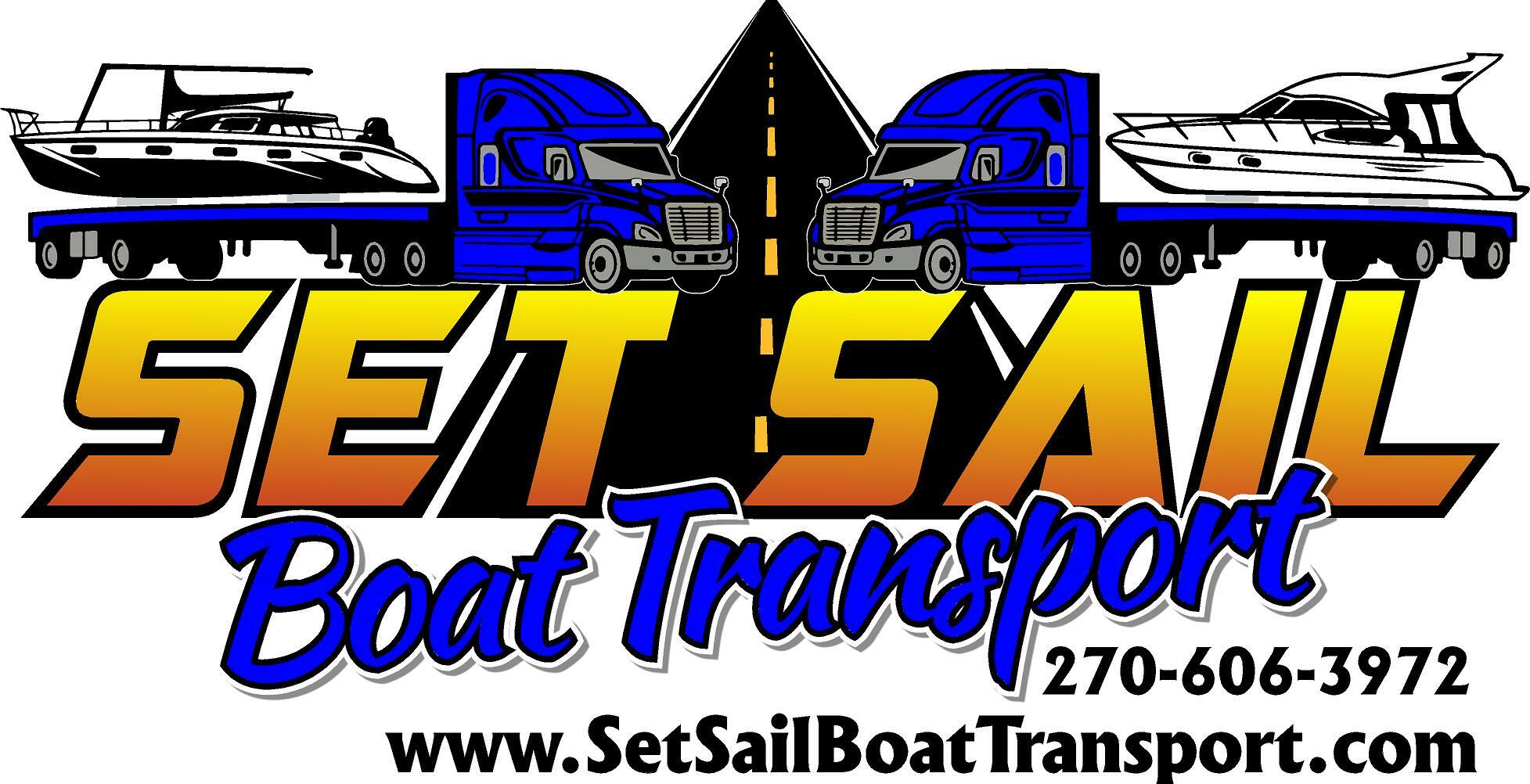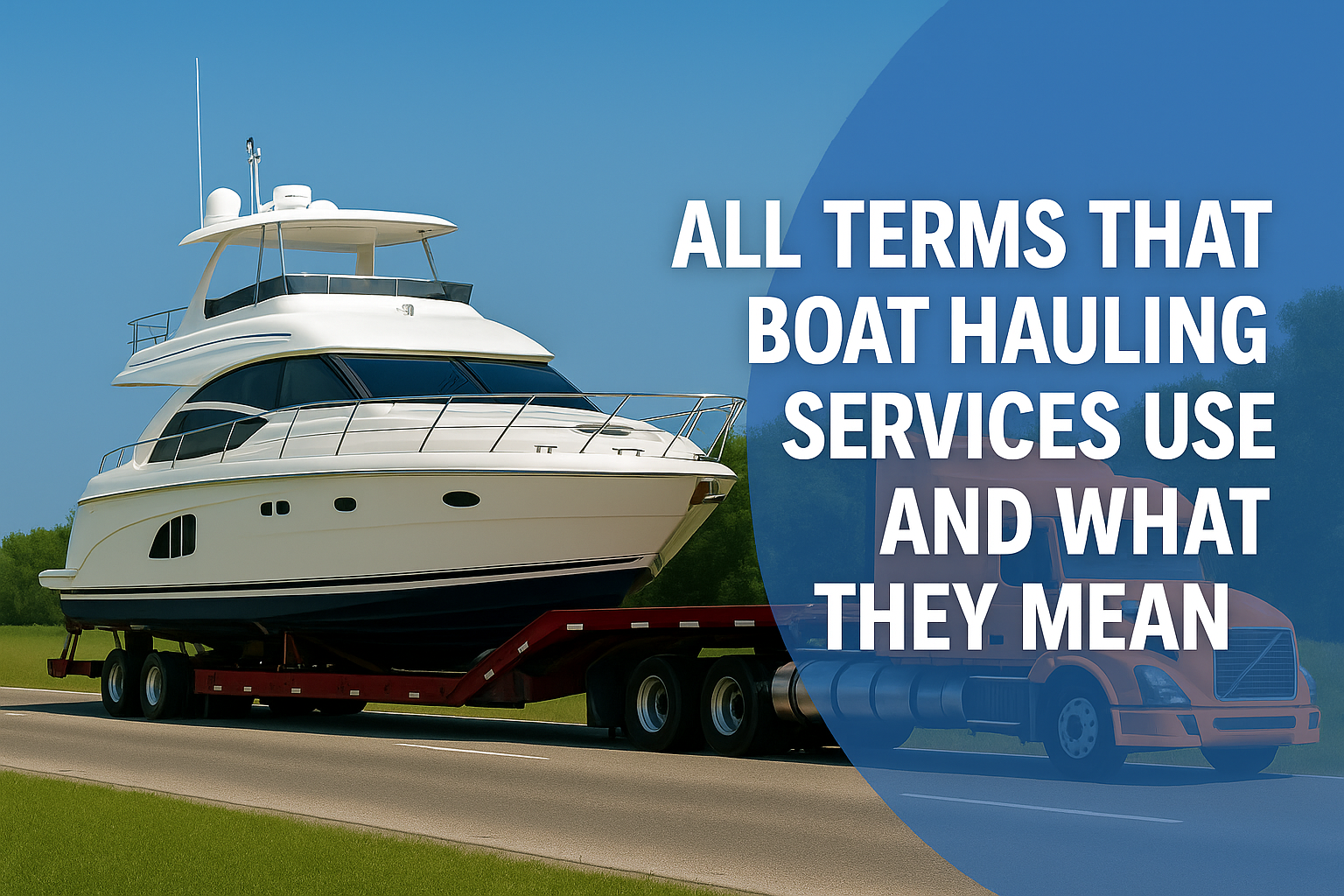
Close


Transporting a boat, whether it’s a small fishing vessel or a large yacht, can be more complicated than it seems. Beyond calculating cost-per-mile and finding ways to reduce your expenses, it’s equally important to understand the terminology used by boat transport service. These terms not only help you grasp what you're paying for, but they can also help you spot the difference between the professionals and shady operators.
Many of these terms sound similar, which is why even experienced boat owners sometimes get misled. So, what do all these boat transportation terms really mean, and how can knowing them help you avoid scams and hire the right hauler?
Before we start discussing what all these terms really mean, it’s important to understand that professional and scam-related terms differ significantly in how they’re used. Professionals use specific terminology to communicate clearly with you and among themselves to deliver high-quality service. On the other hand, shady operators use vague or misleading terms to sound professional, often in a way that hides their true intentions and allows them to scam you without your knowledge.
Take, for example, the term “DOT-compliant hauler,” which is used by professionals, and another term, “licensed transporter,” which is often misused by scammers. Both may seem to convey the same idea, that the service is licensed. However, one is very specific and verifiable, while the other is intentionally vague.
And these aren’t the only terms. There are many other terminologies used in boat transportation, which we’ll break down in the sections ahead.
The terminologies used by professionals in boat transportation in the USA are different than those used by the scammers, and we need to discuss both separately for a better understanding. So, the following are all the complex terms used by professional boat haulers in the USA:
The term “DOT Compliant hauler,” or simply just DOT Compliant, is used to signify that the boat transportation company is registered under the Department of Transportation (DOT). It is essential because A DOT-compliant hauler follows federal safety, maintenance, and driver regulations. This is mandatory for any company involved in interstate boat transportation in the USA.
The DOT Compliance is not the only registration you need, because there is another registration body called the Federal Motor Carrier Safety Administration (FMCSA). The Motor Carrier (MC) number is there to prove that the company is authorized for commercial interstate hauling. It's publicly verifiable and is a strong sign of legitimacy.
The Certificate of Insurance is there to imply that the boat hauling services you are going to avail of have active liability, cargo, and possibly marine insurance. Although damages can still happen, this protects your boat against damage during transit.
Boats wider than 8.5 feet, which are mostly yachts and sailboats, often require a special oversized load permit from each state they pass through. A professional boat or yacht transport will handle these permits and ensure compliance with state-by-state transportation laws.
Your boat might possibly need certain vehicles, perhaps even a police mobile, to escort it in certain states like California and Texas. The term “Escort or Pilot Car Services” is simply used to imply that, and scammers are wary when using this term.
There are other specific terms used by professional boat transportation companies in the USA. These terms are:
Note how all these terminologies, despite being complex, are very specific and leave almost no room for a different explanation. They are specifically made such that they cover every possible detail and leave no room for change. On the other hand, shady operators might use similar-sounding terms, but they sound vague and can differ from one scammer to another, which are explained further.
Contrary to the terms used by professionals, which are all very specific and to the point, scammers use terms that sound like professional terms, but often leave a lot of room for change. These terminologies are discussed below:
This term sounds official, but it’s often meaningless. Scammers may have nothing more than a general business license, which doesn’t authorize them for boat hauling. They use this vague label to avoid disclosing whether they’re DOT-compliant or possess a Motor Carrier (MC) number, both of which are crucial for legal and insured interstate boat transportation.
This is one of the most abused phrases in the industry. Many scammers claim to be “fully insured” but won’t provide a Certificate of Insurance (COI). In reality, they might only have personal auto insurance, or none at all.
On the surface, this sounds appealing, but it’s often used to bait customers with a low price upfront. After pickup, these haulers may add unexpected charges for permits, escort vehicles, fuel, or even route changes. It’s a catch-all term that hides a lack of cost transparency, which is something a professional hauler would never do.
Some scammers go beyond the commonly used terms like licensed transporter and fully insured, and use the term “DOT Certified” to lure you into their trap. Here’s a bubble burst: the term “DOT Certified” isn’t a thing. The Department of Transportation only registers carriers, hence the legit term “DOT-compliant,” and it certainly doesn’t "certify" them. This term is fake and meant to impress.
By understanding the specific terms used in boat transportation, you can better evaluate the credibility of a hauling service before committing. Recognizing the difference between professional terminology and vague, misleading language helps you avoid common scams and ensures that your boat is handled safely and legally. Hiring a professional boat transportation company in the USA ensures both your boat and your safety in terms of legal issues, so contact a professional hauler today and have peace of mind and your boat’s safety.
How can I tell if a boat hauling company is actually licensed and insured?
Look for the DOT registration number, MC number, and COI. These are the minimum requirements to look for in any boat transportation company in the USA. Be cautious if a company doesn’t have one.
What’s the difference between “DOT-compliant” and “DOT certified”?
The term “DOT-compliant” is an actual term, while “DOT certified” is fabricated. DOT Compliant means the company is registered and adheres to Department of Transportation rules, while the Department of Transportation does not provide any certification. The scammers who use DOT-certified are usually very sophisticated scammers
Why do some companies offer a much lower boat-hauling rate than others?
Scammers often attract customers with suspiciously low flat rates, only to add hidden charges later or skip legal steps like permits or escorts. A transparent quote from a professional has everything upfront, including permits, insurance, and route planning.
Do all boats need escort or pilot car services during transport?
No, not all boats need escort or pilot car services. Only the boats over 12 feet wide need an escort. Plus, some states don’t require an escort and only ask you and your boat transport company to adhere to the general rules.